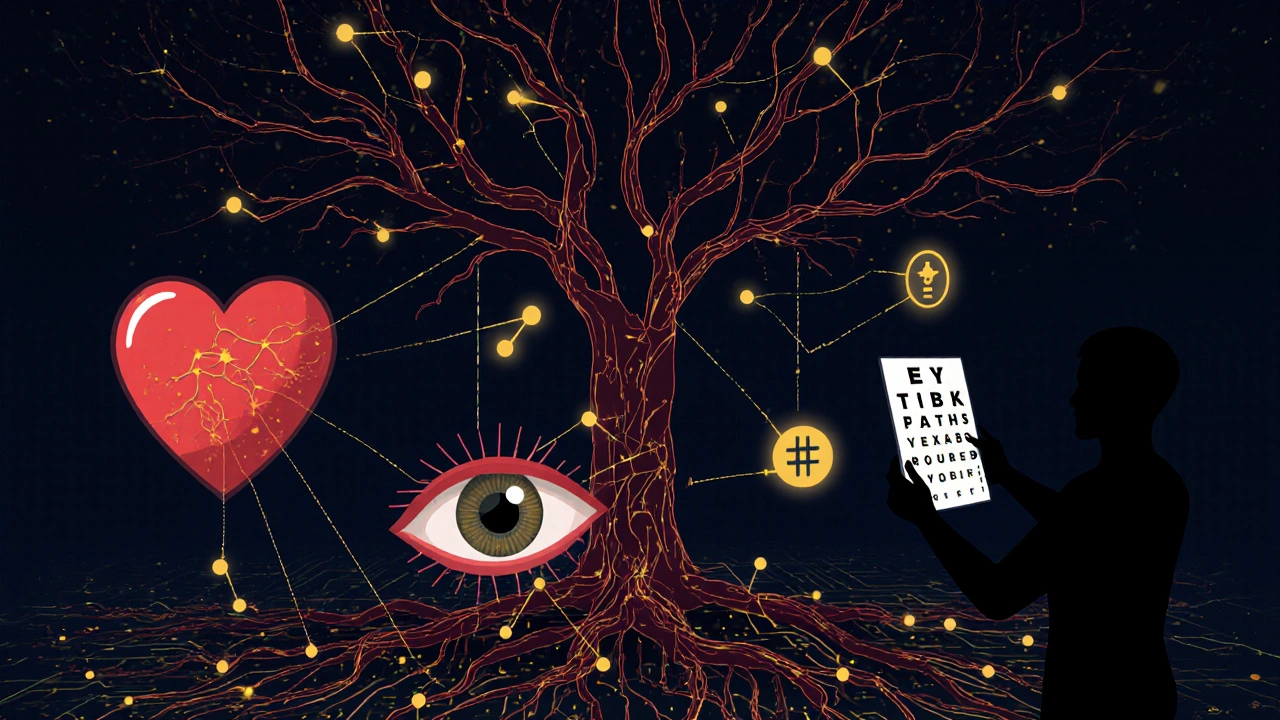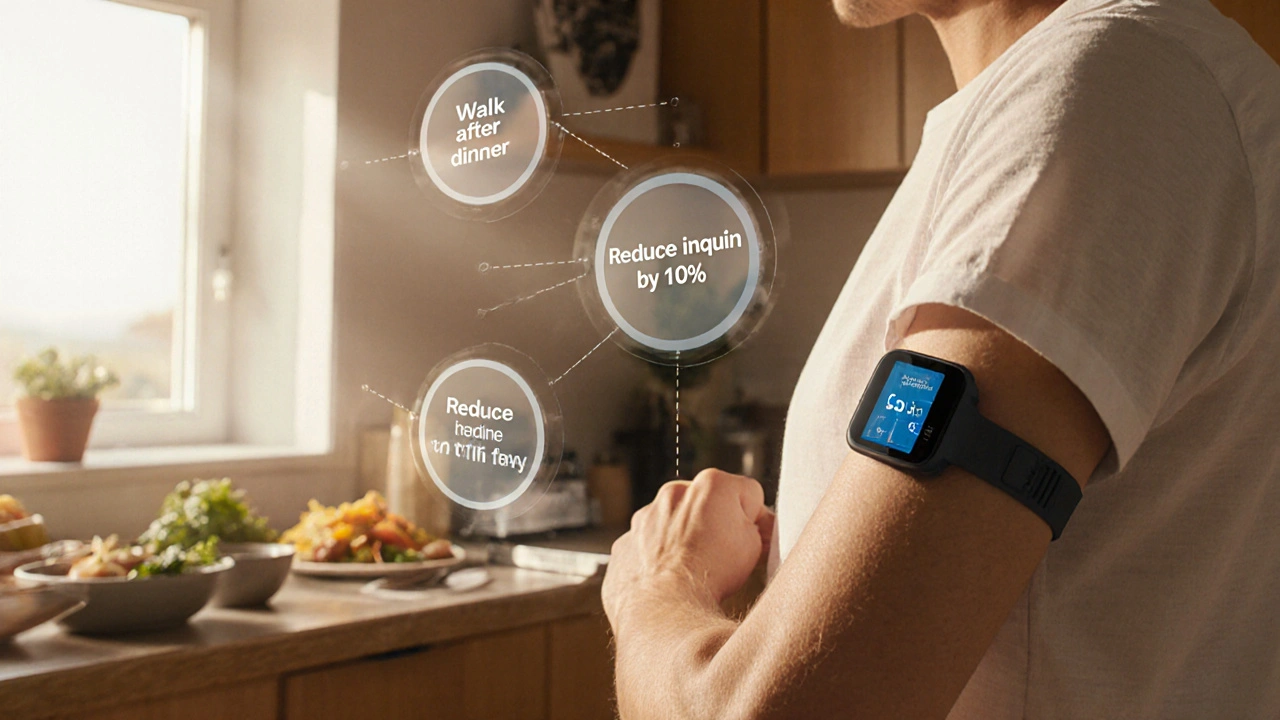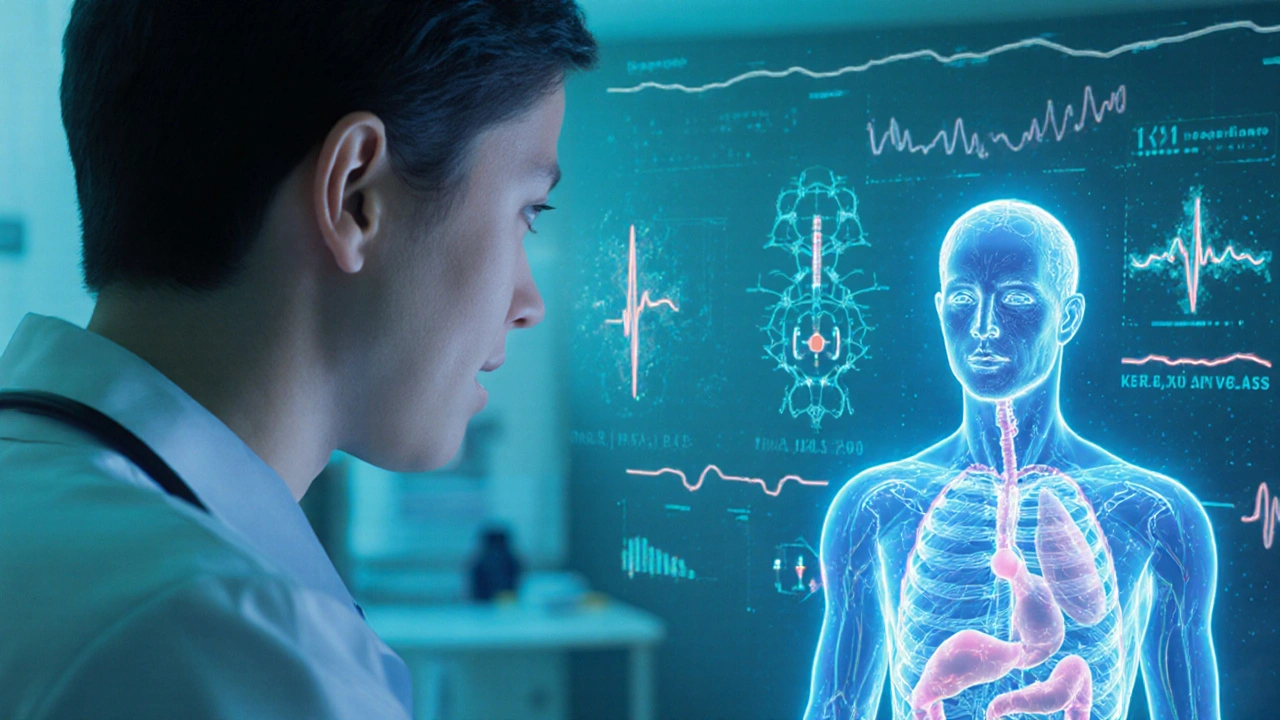Personalized Health Risk Calculator
See how AI analyzes your health data to predict disease risk before symptoms appear. This tool demonstrates how personalized medicine uses your unique biology to create tailored health insights.
Your Health Information
How AI Works
Example: AI might detect early pancreatic cancer through blood protein patterns up to 18 months before symptoms, as seen in University of Calgary studies.
Accuracy: AI can predict treatment response with 89% accuracy (vs traditional 75%) for conditions like breast cancer.
Your Health Risk Assessment
Your personalized risk score: 24% of developing certain conditions over the next 5 years
AI vs Traditional Prediction
Traditional Method: 32% risk (based only on age and symptoms)
AI Analysis: 24% risk (incorporates genetic patterns, lifestyle, and early biomarkers)
AI Insights
Based on your input data, AI identifies:
- Slightly elevated heart disease risk from smoking patterns
- Genetic predisposition to type 2 diabetes (family history)
- Early indicators of metabolic issues from sedentary lifestyle
For decades, doctors treated diseases the same way for everyone. A patient with type 2 diabetes got the same diet plan, the same pills, the same advice-even if their body reacted completely differently. But that’s changing. Thanks to artificial intelligence, medicine is finally starting to treat people as individuals, not just cases in a chart.
What Personalized Medicine Really Means
Personalized medicine isn’t just a buzzword. It’s about using a person’s unique biology-genes, lifestyle, environment, even gut bacteria-to shape their treatment. Think of it like this: two people with the same cancer diagnosis might need completely different drugs because their tumors have different genetic mutations. AI helps spot those differences fast.
Before AI, analyzing a single patient’s genome could take weeks and cost tens of thousands of dollars. Now, AI models can scan a full genome in hours for under $500. Companies like Illumina and Tempus use machine learning to find patterns in genetic data that humans would miss. One study from the Mayo Clinic showed AI could predict which breast cancer patients would respond to tamoxifen with 89% accuracy-far better than traditional methods.
How AI Finds Patterns Humans Can’t See
Doctors are great at spotting symptoms, but they can’t hold millions of data points in their heads. AI can. It looks at everything: MRI scans, blood tests, wearable device readings, even how a patient walks or speaks. A patient with early Parkinson’s might not show tremors yet, but their voice tone or typing speed might already be changing. AI picks up on those tiny shifts.
In 2024, Stanford researchers trained an AI on over 200,000 retinal scans. The model learned to predict heart disease risk just by looking at eye images-better than standard cholesterol tests. Why? Because blood vessels in the eye reflect what’s happening in the whole body. No one had connected those dots at scale before AI.
Drug Development That Actually Works
Developing a new drug used to take 10 years and cost $2.6 billion. Most failed because they worked in lab mice but not in humans. AI is cutting that waste. Companies like Insilico Medicine use generative AI to design molecules that target specific proteins in specific patient groups. One AI-designed drug for idiopathic pulmonary fibrosis entered human trials in just 18 months-half the usual time.
AI also predicts which patients are most likely to benefit from a drug before it’s even tested on them. In a trial for a new Alzheimer’s treatment, researchers used AI to screen 10,000 patients and found just 300 who had the exact biological markers the drug targeted. Those 300 had a 60% improvement rate. The rest? No effect. That’s not bad luck-it’s bad trial design. AI fixes that.

Real-Time Treatment Adjustments
Medicine doesn’t stop at diagnosis. It keeps going. AI doesn’t just help start treatment-it helps adjust it. Imagine a diabetic patient wearing a continuous glucose monitor. Their device sends data every five minutes. An AI app learns their patterns: how their blood sugar spikes after pasta, drops after evening walks, and crashes when they skip breakfast. It doesn’t just warn them-it suggests changes in real time: "Try a 10-minute walk after dinner tonight. Your insulin dose might need to drop 15% tomorrow."
That’s not science fiction. The FDA approved the first AI-powered insulin dosing assistant in 2023. It’s already in use at hospitals in Toronto, Chicago, and Calgary. Patients using it saw 30% fewer dangerous low-blood-sugar episodes in six months.
Why Some Doctors Still Hesitate
Not everyone’s excited. Some doctors worry AI will replace them. It won’t. It’s a tool-like a stethoscope or an X-ray machine. But trust is slow to build. Many AI models are black boxes: they give an answer but don’t explain how. That’s dangerous in medicine.
That’s why newer systems like IBM Watson for Oncology now include explainability features. When it recommends a treatment, it shows which genes, lab results, and patient history factors led to that choice. Doctors can check the logic. If something looks off, they override it. The best AI doesn’t make decisions-it empowers decisions.

What’s Still Missing
AI in medicine isn’t perfect. Data bias is a big problem. Most training data comes from white, middle-class populations in the U.S. and Europe. That means AI might miss warning signs in Black, Indigenous, or Asian patients. A 2024 study in Nature found that AI models used to predict kidney disease risk were 30% less accurate for Black patients because they were trained on data that didn’t reflect their health patterns.
Privacy is another hurdle. Your genome is the most personal data you have. Who owns it? Who can access it? Laws haven’t caught up. In Canada, the Personal Information Protection and Electronic Documents Act (PIPEDA) gives patients rights-but enforcement is patchy.
And cost? While AI reduces long-term expenses, upfront costs are high. Small clinics in rural Alberta can’t afford the servers, software, or specialists needed to run these systems. Without investment, AI could widen the gap between rich and poor healthcare.
What’s Next? The Next Five Years
By 2030, your doctor might not just ask about your symptoms-they’ll ask about your sleep quality, stress levels, and even your social media posts (with your permission). AI will combine all that with your DNA, microbiome, and real-time vitals to build a living health profile.
Imagine this: You get a routine blood test. Within 24 hours, an AI flags a slight rise in a protein linked to early pancreatic cancer. It cross-references your family history, your recent travel, your diet logs, and your fitness tracker data. It doesn’t scream "cancer!"-it says, "Your risk is 2.3% higher than last year. Let’s do a low-dose CT scan next month."
That’s not a fantasy. It’s already being tested in pilot programs at the University of Calgary’s Alberta Precision Laboratories. Early results show AI can detect cancer signals up to 18 months before symptoms appear.
Final Thought: AI Doesn’t Replace Doctors-It Makes Them Better
The goal isn’t to hand over healthcare to machines. It’s to give doctors superpowers. AI handles the noise. Doctors handle the human part: compassion, context, choice. A patient with a terminal diagnosis still needs someone to sit with them. But before that conversation, AI can tell the doctor exactly which clinical trials match the patient’s genetics, which side effects to warn about, and which family members might be at risk.
Personalized medicine powered by AI isn’t the future. It’s here. And the people who benefit most aren’t tech experts-they’re the ones lying on the exam table, hoping for care that fits them, not the other way around.
Can AI really predict diseases before symptoms appear?
Yes. AI models trained on large datasets of genetic, imaging, and lifestyle data can detect early biological changes long before a person feels sick. For example, AI has predicted Alzheimer’s risk from eye scans and early-stage pancreatic cancer from blood protein patterns-up to 18 months before symptoms. These aren’t guesses; they’re statistical patterns confirmed in clinical trials.
Is AI in medicine only for big hospitals?
No. While large clinics have more resources, cloud-based AI tools are making it easier for small practices to use. Platforms like Google Health and Microsoft Health Bot offer affordable, plug-in AI tools for EHR systems. A family doctor in rural Saskatchewan can now run AI-powered risk assessments using just a laptop and internet access. The barrier is less about tech and more about training and funding.
How safe is my genetic data when used by AI?
It depends. In Canada, PIPEDA requires consent and limits data sharing, but enforcement varies. Reputable medical AI systems use encryption, anonymization, and strict access controls. But not all do. Always ask how your data is stored, who can see it, and whether it’s used for research. Opt out if you’re uncomfortable. Your genome is yours-and you have the right to control it.
Does AI work better for some diseases than others?
Yes. AI excels where data is abundant and patterns are clear: cancer genomics, diabetic retinopathy detection, heart rhythm analysis, and psychiatric disorder prediction. It’s less effective for conditions with vague symptoms or little data-like chronic fatigue or fibromyalgia. But even there, AI is helping by finding hidden correlations between lifestyle factors and flare-ups.
Will AI replace my doctor?
No. AI doesn’t understand empathy, cultural context, or personal fears. It can’t sit with a patient who’s scared. It can’t explain a diagnosis in a way that feels human. What it does is give doctors more time to do those things-by handling data crunching, flagging risks, and suggesting options. The best doctors are the ones who use AI as a co-pilot, not a replacement.
Can I use AI tools at home for my own health?
Some can, but be careful. Apps that track sleep or glucose levels are helpful. But avoid apps claiming to "diagnose cancer" or "predict your risk of stroke" based on a selfie or voice recording. Those are often unregulated and inaccurate. Stick to tools cleared by Health Canada or the FDA, and always discuss results with your doctor.

